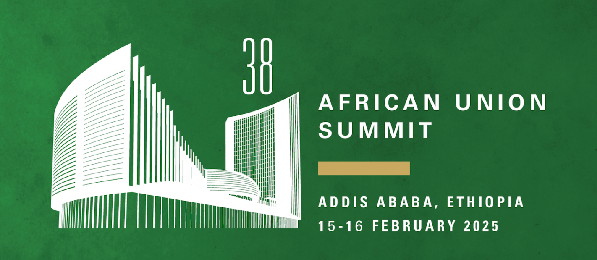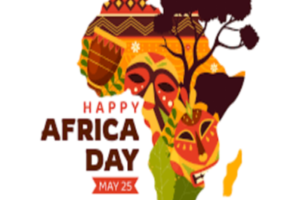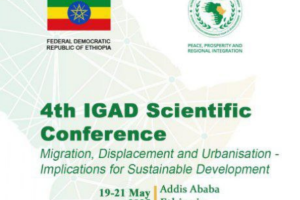
Africans from all walks of life have turned attention to Addis Ababa as the 38th African Union Summit for heads of state and government takes place. The summit aims to address the pressing challenges the continent faces and explore prospect solutions for a better future. The scale and complexity of these challenges are undeniable, and the expectations and hopes of Africans are bound to be high.
At this summit, the leaders are expected to address the ongoing crises in Sudan and the Democratic Republic of the Congo (DRC). Besides, due attention will be accorded to the election of a new chairperson for the AUC given that Moussa Faki Mahamat’s two terms come to an end. Three candidates from East Africa have been presented: Djibouti’s Foreign Minister Mahmoud Ali Youssouf, Kenya’s opposition veteran Raila Odinga and Madagascar’s former Foreign Minister Richard Randriamandrato. The new AU president for the year will be the Angolan President Joao Lourenco.
Although these gatherings have become a regular feature in African affairs, and this year is marking the 38th summit, each summit is expected to result in breakthroughs that would benefit Africans as a whole and bring solutions to some of the continent’s most urgent crises and most consequential issues that need immediate attention. For instance, the situation in the Sudan needs to be addressed sooner than later before the worst catastrophe in the history of the continent unfolds. Already thousands have died and millions displaced, according to numbers that the UN presents. ,
The conflict between the DRC army and the M23 rebel armed forces must find some sort of solutions immediately because the number of casualties is bound to increase to intolerable limits. Besides, the crisis risks spilling over to other countries nearby and result in a regional catastrophe that could potentially destabilize the continent. If African problems are said to be resolved by Africans, these are two instances in which African leaders must come up with implementable plans and act in unison to convince the parties in these crises to come to the negotiating tables and spare the lives and livelihoods of potentially millions of Africans. The external world will make a mockery of our continental body when they see that it cannot even stop such violence that has been ravaging the stated countries for years now.
The AU is hence challenged by similar crisis without any positive outcome. In any case, Addis Ababa is accustomed to hosting such continental events for years. And given that it is the headquarters of the AU Commission, it has been holding these summits every year around the beginning of the year. Likewise, residents of Addis Ababa are also well accustomed to witnessing these historical gatherings in their city in which a special atmosphere reigns in the main avenues and hotels.
Delegations of potentially all member states of the AU are expected to attend the summit and the deliberations are expected to be reported by more than a thousand reporters and correspondents from all over the world given the importance of such an event. After all, it is not every day that such summits are held. The world will also have the opportunity to test the pulse of African leaders and which agendas are most urgent for them and what decisions are adopted.
The importance of the continent to the world at large is undeniable and what happens in Addis these days can give directions on what issues are most urgent and which ones can take some time to decide upon and hence wait in the pipeline for another occasion.
Be that as it may, the Ethiopian Ministry of Foreign Affairs has declared that Addis is ready to host successfully this 38th AU Summit from every point of view. The security situation is reliable as usual as Addis is accustomed to hosting such important events multiple times every year and hence avails of the necessary expertise. The records show that there have never been any security incidents that have jeopardized the smooth undertaking of the summits. The guests and delegations have always returned to their homes without being subjected to any unpredictable circumstance as every thing has taken place as per the schedules of the delegates. Those who attended these conferences and meetings have always testified to their full satisfaction of their stay in Ethiopia and the organizing committee knows this.
This year there has also been the special invitation of Prime Minister Abiy Ahmed (PhD) to those who come to the summit to seize the opportunity to stay a few days more and enjoy visiting some of the newly built historical sites in Addis. Specifically, a look at the Adwa Victory Memorial Museum would be a worthy experience. Africans who do not exactly know about this battle and victory of the eighteen nineties will have a full picture of that glorious event. They will come to discover what was involved in the battle and who the protagonists were. This is a place that every African must see and be proud of it because it has been an inspiration to the freedom fighters of Africa in their efforts to free themselves from colonial rule. It was also the conception moment of the grand idea of PanAfricanism.
Hence this occasion of the summit will be a wonderful one to kill two birds with one stone. Moreover, it is also worthwhile to visit the recently renovated National Palace Museum, where parts of Ethiopian and even African history are exhibited. Particularly, the history of modern day Ethiopia focusing on the leaders and their activities are depicted at the palace. Many personal items of the leaders such as their vests, their furniture and even kitchen appliances are in display. Emperor Haile Selassie’s treasures are very dominant in this museum but other leaders also have some space. It is a window to the recent history of Ethiopia which was never displayed before.
So is the Unity Park where lots of other historical items are seen especially concerning the Emperor Menelik, the famous monarch who led the battle of Adwa. You also see here a representation of all Ethiopian regional states with their characteristic features. Some animals are also in display including the famous black lion.
Moreover, there are several other attractions not only in Addis but also outside. The historical UNESCO registered heritage sites take the lion’s share. Hence, the obelisks of Axum, the Fasiladas Castles, the rock hewn churches of Lalibela and the wonders of the source of the Blue Nile or Abay around Lake Tana are prime sites. The Gorgora Resort which is newly built between Gondar and Bahir Dar is also another gem added to the above sites. There are also other wonderful resorts such as the Halala Kela Resort and Chebera Chur Chura in the south, the Wonchi Resort some kilometers from Addis, and others that are worth visiting in a few days. They give the visitor a good first hand view of what Ethiopian history and geography look like.
The number of ultramodern hotels here in Addis or outside is now more than enough. They are all available and fully ready to host the expected more than fifteen thousand guests. The former scarcity has been adequately addressed. Addis teems with so many five star hotels with full accommodation.
The moderate climate of Addis is another quality of the city and witnesses have admired this element of Addis. Moreover, the Ethiopian cuisine is a reflection of all the various nations and nationalities that compose the Federal Democratic Republic of Ethiopia and has been acclaimed by all those who have had a taste of it. Regarding night life, Addis presents clubs and restaurants where both Ethiopian traditional music as well as modern beats are played with traditional musical instruments accompanied by experienced traditional dancers.
Many people who visited Addis before are now amazed by the kind of changes the city has undergone with the ongoing Corridor Development Project. Entire shantytowns have been demolished; new modern buildings have replaced them. The streets have been enlarged and renovated with large side walks and green areas. Benches for walkers and modern toilets have been availed. Fountains along the avenues and squares are built and electric bulbs on all major buildings of the city are installed making the city shine even during nights.
The parks and green areas are simply amazing because not only do they give beauty to the city but also contribute to the battle against climate change added to the fifty billion tree seedlings already planted throughout the country in the past few years. Many thus have said that the country is undergoing a transformation. The IMF director who recently visited Ethiopia has given her positive testimonial in this regard.
The 38th AU heads of state and government meeting is carried out in this context and what Ethiopians wish is success resulting in significant consensual decisions. Important messages are also expected to be released because the theme of the summit is “Justice for Africans and People of African Descent through Reparations”. At the centre of all this is the quest for reparations for the wrongs of the colonial epoch and for the atrocities committed during the slave trade!
BY FITSUM GETACHEW
THE ETHIOPIAN HERALD SATURDAY 15 FEBRUARY 2025




